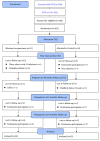Effects of a prenatal mindfulness program on longitudinal changes in stress, anxiety, depression, and mother-infant bonding of women with a tendency to perinatal mood and anxiety disorder: a randomized controlled trial
- PMID: 37525110
- PMCID: PMC10388457
- DOI: 10.1186/s12884-023-05873-2
Effects of a prenatal mindfulness program on longitudinal changes in stress, anxiety, depression, and mother-infant bonding of women with a tendency to perinatal mood and anxiety disorder: a randomized controlled trial
Abstract
Background: Stress is a risk factor for poor physical and mental health, affecting new mothers' ability, especially those with perinatal mood and anxiety disorders, to maintain their everyday lives. Over the past 50 years, global incidences of depression and anxiety disorders have increased, reaching pandemic levels. These incidences represent major public health issues that are challenging to detect and treat. Mindfulness programs are viable for reducing stress, anxiety, and depression. The present study evaluates mindfulness intervention effects on stress, anxiety, depression, and mother-infant bonding.
Methods: We collected data on 102 women participating in a prenatal mindfulness program between July 2021 and March 2022; they were parallel and randomly assigned to experimental or control groups. The intervention group received an 8-week course in a prenatal mindfulness program, and the control group received usual standard prenatal care. The self-reported stress, pregnancy-related anxiety, and depression were assessed before and after the intervention and at 36 weeks of gestation. At 2 and 4 months postpartum, all participants provided self-reported their levels of stress, depression, and quality of mother-infant bonding.
Results: Compared to the control group, the experimental group that received the prenatal mindfulness intervention experienced reduced prenatal stress, anxiety, and depression and reduced postnatal stress and depression. Despite this, there was no significant difference between the groups in terms of the quality of mother-infant bonding.
Conclusions: Mindfulness prenatal programs are convenient and effective methods of decreasing stress, anxiety, and depression during the perinatal period. Based on our findings, prenatal mindfulness may play a role in mitigating mood and anxiety disorders and should be considered in future approaches to preventing psychological distress.
Trial registration number: This trial has been prospectively registered at ClinicalTrials.gov (NCT04693130) and the first registration date was 12/24/2020.
Keywords: Depression; Mindfulness; Mother-infant bonding; Perinatal care; Stress.
© 2023. The Author(s).
Conflict of interest statement
The authors declare no competing interests.
Figures


References
-
- Shih P, Wu CD, Chiang TL, Chen PC, Su TC, Cheng TJ, et al. The association between postpartum depression and air pollution during pregnancy and postpartum period: a national population study in Taiwan. Environ Res Lett. 2021;16(8):084021. doi: 10.1088/1748-9326/ac1224. - DOI
-
- Chen ML, Chang SR. Depression and stress of women and their spouses during the postpartum period. J Formos Med Assoc. 2022;26(2):143–9.
Publication types
MeSH terms
Associated data
Grants and funding
LinkOut - more resources
Full Text Sources
Medical
Miscellaneous

